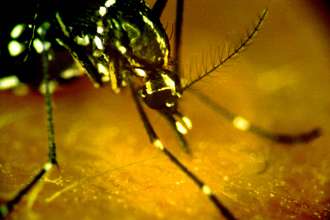West Nile outbreak—more questions than answers

The weather may not be the only culprit behind the country's worst outbreak of West Nile virus. Public health researchers are investigating whether the virus itself has changed.
Dawn Wesson, associate professor of tropical medicine at the Tulane University School of Public Health and Tropical Medicine, is working with local mosquito control officials and colleagues at Louisiana State University to collect and study mosquitoes in South Louisiana.
Investigators track how many of the insects are infected and isolate the virus in the lab to study its infection dynamics to determine what might be different than prior strains. So far, the numbers of infected mosquitoes they're finding in the state this year "are just crazy—off the charts."
"We have never had this many mosquito infections before," Wesson says. "The virus may have mutated and is acting a bit differently."
Researchers want to find out whether this year's strain of West Nile is more infectious for mosquitoes, the primary vector. So far, there are more questions than answers. Is this strain less virulent for people, but better at latching onto the vector?
Wesson and colleagues hope to shed further light on why this West Nile season has been so active. There have been 1,118 cases and 42 deaths in the United States with 640 severe cases, as of Aug. 22.
Most agree that weather is the primary factor behind the increase. A late drought last year helped concentrate populations of birds who carry the virus and mosquitoes that transmit it. A mild winter meant more of the insects survived and bred, while a wet summer in the South caused a population boom for mosquitoes.
The good news is that aerial spraying is having an impact in reducing mosquito populations in areas with outbreaks, Wesson says. Her advice is to take precautions when going outside by wearing long sleeves and using a DEET-based repellant.

















